
Allergies whether food or environmental should be taken into account by the company. The growing number of allergic asks a question, but where do they come from? The most common explanations revolve around changes in the diet, the misuse of plastics, pollution or other environmental factors due to modern life. A publication of U.S. researchers examines one possible explanation: the use of pesticides and their presence in tap water.
From 2005 to 2006, 10,348 people responded to a massive survey on nutrition and health: the U.S. National Health and Nutrition Examination Survey. It is from this data set that researchers have worked. Among those who responded to the questionnaire, 2548 had their urine measured for very specific pesticides: dichlorophenols, 2241 measures were selected for the study. From this group, there were 411 food allergies and allergies 1016 environmental. ’s dichlorophenols are chemical compounds made from phenol and two chlorine atoms. Chlorophenols are conventionally used in herbicides, pesticides and bactericides. These are molecules used in agricultural processing in pesticides homes or even in the treatment of tap water. His action to make drinking water. Results of the study show a high level of chlorinated phenols in the urine increases the risk of getting allergies in the subject. This is true for food allergies. For allergies caused by airborne allergens, no link has been established with the presence of chlorinated phenols. Note that the high dichlorophenols was defined when subjects exceeded the 75th percentile.
According to the researchers, one way to protect against the onset of food allergies would be to drink bottled water, tap water is sometimes responsible for harmful compounds in the long term. The interview does not specify whether the researchers recommend water in glass bottles, plastic has more detractors. Anyway this measure would not be sufficient. Indeed, we find this kind of chemical compounds in fruits and vegetables sold on the shelves of supermarkets, but also local markets. molecules implicated are certainly not the only fault of the upsurge in food allergies, but this study shows precisely the role of pollutants in our environment on human health. The link between pesticides and food allergy is recognized. A paper returns to the presence of chlorination by-products in drinking water, especially in France. It is published by the Institute of Health Surveillance.
